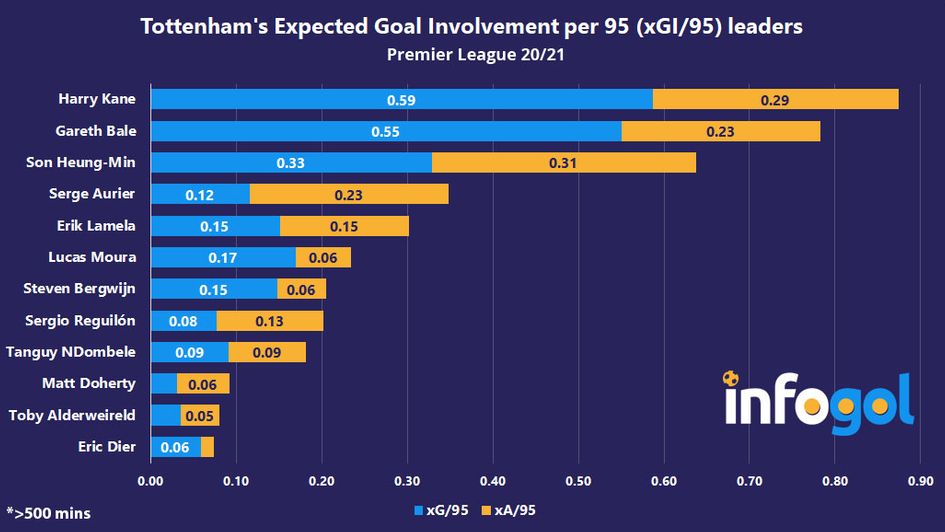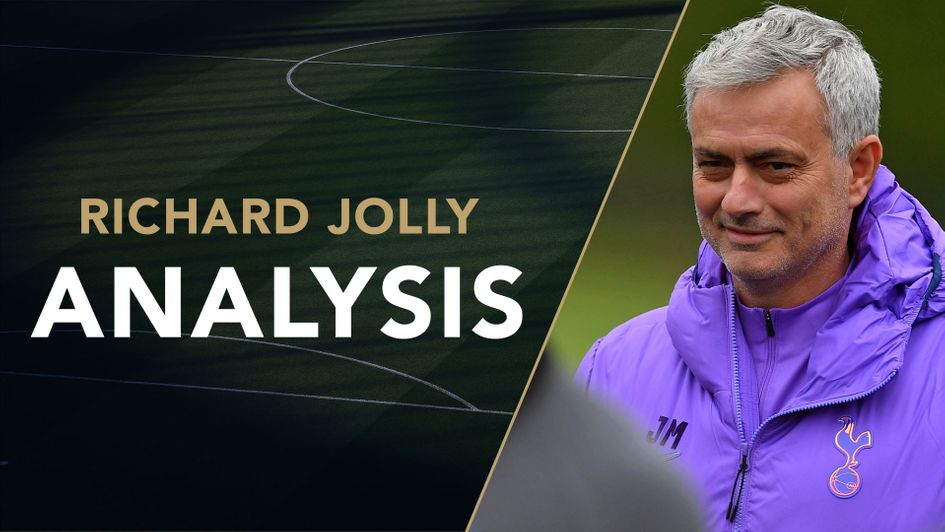Jose Mourinho, the unlikely entertainer? Tottenham have veered from roundheads to cavaliers, from impotent to prolific.
Perhaps they have gone from a team destined, at best, for another season in the Europa League to one who can qualify for the Champions League.
It could be called the Bale revival. After only beginning two previous league games this season, the Welshman has started the last three. Spurs have won all, scoring nine.
It may be worth noting that all five of his starts are against bottom-eight teams and that Tottenham only have three more such fixtures remaining.
Yet it marks a sea change in Spurs’ output; perhaps in their approach, too. Tottenham scored four goals each against Burnley and Crystal Palace; they scored four or more in two of their first four, at Southampton and Manchester United, but never in between.
They had had seven shots on target against the Clarets, a number they had only reached once (against Leeds) since the 6-1 thrashing at Old Trafford.
Their expected goals (xG) scores against Burnley (2.28) and Palace (2.33) are two of their three highest since the 6-1; the other, 2.88, came in their 3-0 win against Leeds in January, and that perhaps reflects Marcelo Bielsa’s ethos more than Mourinho’s.
What is expected goals (xG)?
- Expected goals (xG) is a metric that measures the quality of any given scoring opportunity
- Expected goals for (xGF) is the xG created by a team
- Expected goals against (xGA) is xG conceded by a team
Tottenham’s attack has been hot and cold
And their season can be split into three parts. In their first five matches, culminating in the 3-3 draw with West Ham, they had a total xG of 12.45, an average of 2.49 per game. In the last three matches, it is 6.62, an average of 2.21 per game. But in the 19 in between, their total expected goals was just 21.5, an average of 1.13 every game and just the 13th best in the division in that time.
In contrast, Spurs had racked up the third most xG through the first five matches of the season, when they were top scorers. They have generated more xG than any other side over the last three matches and are top scorers, albeit when some sides have only played two matches in that time.
In Spurs’ duller and lengthier middle period, their 19 matches only produced 41 goals (22 for, 19 against), meaning only Burnley, Fulham and Brighton were involved in fewer goals in what amounts to half of the eventual season.
In contrast, only Liverpool’s first five matches produced more goals. It prompted Mourinho to go on the defensive; not entirely successfully as Tottenham’s next 19 games only yielded 28 points, putting them eighth in a table for that period.
Is Gareth Bale back to his best?
It may feel simplistic to attribute the transformation to Bale; perhaps it is truer to say that his impact is in part because he has reduced the reliance on Harry Kane and Heung-Min Son. But two braces mean he is now Spurs’ third top scorer. He provides a contrast with the man who has occupied the right-wing berth for some of the season.

Steven Bergwijn has played 1081 minutes in the Premier League for no goals, two assists and a total xG of 1.71. Bale now has the second best xG per 95 minutes (0.55) in Mourinho’s squad; his goals plus assists per 95 (1.20) is only second to Kane’s (1.23), albeit from a much smaller sample size. Factor in Son’s 0.88 and it gives them three of the most potent players in the league. Bergwijn, as an expected assists (xA) of 0.08 per 95 indicates, has not even been creative.
One reason why Bale has been more productive feels relatively obvious: he gets in goalscoring positions. He has scored three times from within the six-yard box whereas, in far more minutes, Bergwijn has not had a single effort from there. Neither has Erik Lamela.
Should Spurs stick with Dele Alli?
The greater involvement of Dele Alli has been another factor; while the winner against Fulham went down as a Tosin Adarabioyo own goal, Alli’s return of 0.43 xG/95 puts him third in the Spurs squad whereas Tanguy Ndombele, who has occupied that role for much of the season before going into a deeper midfield role, averages just 0.09. Meanwhile, Lucas Moura has been preferred to Alli as the No. 10 against Palace and Burnley, registered five shot-creating actions over those two games, compared to just 10 in the rest of the season.
Kane and Son have both registered 10 shot-creating actions in the last three games, both up on their seasonal average. That could be attributed to weaker opposition or to the presence of Bale as an extra high-class attacker.
It can feel like scapegoating Bergwijn, who was given defensive duties to do, to point out that Spurs only average a goal every 63 minutes with him on the pitch, compared to one per 50 with Bale or 48 with Kane; their points-per-game when Bergwijn has featured for at least 30 minutes, at 1.44, is the third lowest in the squad (admittedly Alli is one of the two below him), while Kane’s is an altogether healthier 1.80. Translate that to an entire season and it produces 68 points, which could be enough for fourth this season, whereas 1.44 brings just 55.
If the numbers suggest Mourinho has held Spurs back with his negativity, the remainder of the season presents a challenge and a test. Is he bold enough to pick Bale, and can the Welshman have a similar impact against better teams?







